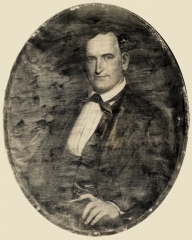and ran south, the fine trees and the adjacent hills covered with fields and woods made an unforgettable impression on them. The residents, too, appreciated the natural beauty of their surroundings.
The professors on the Hill joined the village people in many community enterprises in addition to church affairs, where one would naturally expect to find them. They appeared on lecture series and made speeches at donation parties for local poor relief, and at temperance meetings arid Fourth of July celebrations. A. C. Kendrick, for example, debated before the Hamilton Lyceum with James W. Nye, a local attorney, on whether the career of Napoleon was productive of greater evil than good to mankind. Raymond and Eaton, who seem to have been the most sought-after speakers, along with Spear, Maginnis, and A. C. Kendrick, appeared on the program of lectures before a young men’s society “for improvement in literature.” Though there is evidence that some villagers felt that faculty wives “put on airs,” whatever town-versus-gown feeling there was, Hill and village participation in many common causes helped to minimize.
The antislavery movement of the 1830’s and ’40’s drew the faculty into its maelstrom much against their will. Though fundamentally opposed to Negro bondage, they considered the abolitionism of Gerrit Smith, Garrison, and their associates extreme and fanatical. When a group of radicals in the denomination, some of their friends among them, established the American Baptist Free Mission Society in 1840 as a protest against the failure of Northern Baptists to break with their Southern brethren over the slavery question, the faculty refused to be drawn in. Prominent in the affairs of the Baptist Triennial Convention, they appreciated the complexity of the problem and allied themselves with conservative Northern Baptists, such as President Francis Wayland of Brown, in trying to stave off the split. When it eventually did come they helped to found new Northern organizations for carrying on foreign and domestic missionary work.
The faculty was fearful of any disturbance that abolitionist agitation might raise among the students, village people, and the Baptist moderates who supported the Institution. They were no doubt aware of the serious trouble antislavery activity had caused at other colleges such as Hamilton and Amherst. From Colby they had first-hand information from Professor Conant who had seen the havoc wrought there. The resulting clamor had led to his resignation and that of his father-in-






